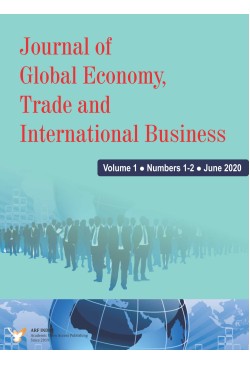JGETIBJournal of Global Economy, Trade and International Business

Peer Reviewed Journal

Peer Reviewed Journal
A Survey of Chinese Corporate Governance Practices: How Government Ownership Affects Corporate Decisions
The relationships between cash holdings, dividend policy, business valuation, and ownership structure of Chinese enterprises are examined in this article. Our paper examines one of the most important aspects of
corporate governance: the impact of government ownership on the valuation of a corporation and its corporate conduct. Our findings demonstrate a strong adverse relationship between company value and the percentage of government ownership in Chinese firms. Additionally, we find that investors do not think that the presence of significant capital holdings in these firms will positively impact the firm’s future profitability, which is why they seek bigger dividend payments from highly government concentrated organizations. In addition, a firm that has a large amount of government ownership is more likely to issue new stocks using the rights offerings method rather than the private placements, which would maintain the company’s shareholder structure and prevent the introduction of extra external scrutiny.
Keywords: Government Ownership, cash holdings, dividend policy, firm value, equity offering method.
JEL classification: G30, G32, G35
Ohaness Paskelian & Stephen Bell (2024). A Survey of Chinese Corporate Governance Practices: How Government Ownership Affects Corporate Decisions. Journal of Global Economy, Trade and International Business. 4(2), pp 61-79.
Street Eats and City Streets: A NYC Case with Global Implications
This case study examines the challenges faced by New York City’s street food vendors, particularly those selling “Halal” food, focusing on regulatory, competitive, and operational hurdles. Through a qualitative exploratory
research design, it reviews secondary data from scholarly articles, industry reports, and online sources to offer a comprehensive view of the street vending landscape. The study also adopts a global perspective, comparing NYC’s experience with street food management in cities like Singapore, Mumbai, and London. Key issues addressed include complex regulations, competition with brick-and-mortar businesses, and public space constraints. The study highlights the transformative role of emerging technologies such as mobile payments and delivery apps in street vendors’ operations. Conclusions emphasize the need for clear, fair regulations and collaborative efforts between vendors and city authorities. This research contributes to scholarship on urban economies and informal markets, offers vendors guidance on navigating regulatory challenges, and provides policymakers with strategies for fostering a sustainable and vibrant street food culture.
Keywords: New York City, Halal Food Carts, Street Food, Regulation, Vendors, Global.
JEL Classification Code: M38; K23
Nayyer Naseem, Lucinda Blue & Bryan Patterson (2024). Street Eats and City Streets: A NYC Case with Global Implications. Journal of Global Economy, Trade and International Business. 4(2), pp 81-113.
Multinational Enterprises from China: Distinctive Features, Theoretical Background, and Research Perspectives
In recent years, Chinese multinational enterprises (MNEs) have made significant investments in other countries, even acquiring internationally recognized Western brands. The internationalization process of Chinese
MNEs presents distinctive characteristics that make it different from that followed by their counterparts from developed countries. These unique features are an accelerated internationalization process, sometimes without
previous ownership advantages, and a relatively lower aversion to risk. All this has opened an epistemological debate among scholars about whether traditional theories, built upon developed country MNEs, can be applied to explain the idiosyncratic behavior of Chinese MNEs, or if it is necessary to develop new theories. This article shows the underlying reasons that may explain this less conventional behavior and addresses the theoretical frameworks used by scholars.
Keywords: Multinational enterprise, foreign direct investment, China, theories, challenges.
JEL codes: F21, F23, M16.
Diego Quer (2024). Multinational Enterprises from China: Distinctive Features, Theoretical Background, and Research Perspectives. Journal of Global Economy, Trade and International Business. 4(2), pp 115-131.